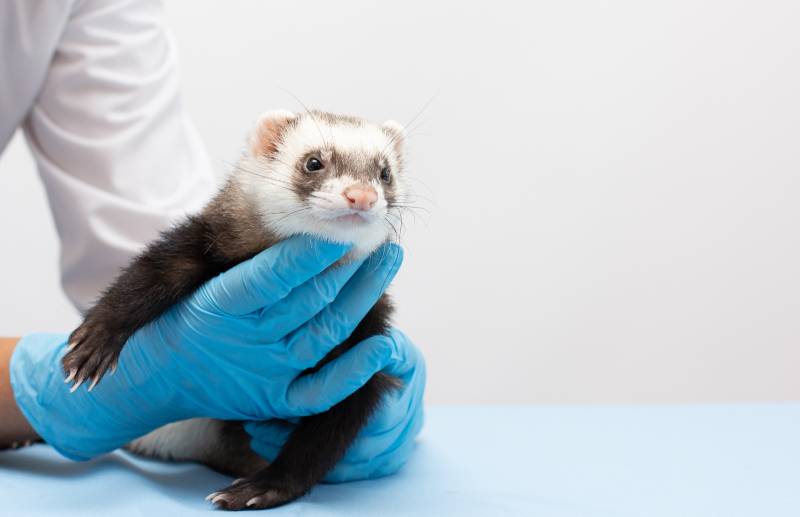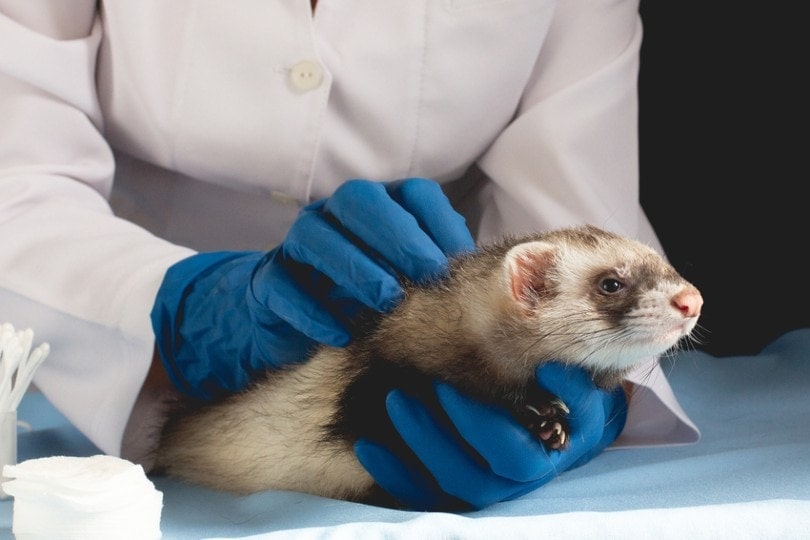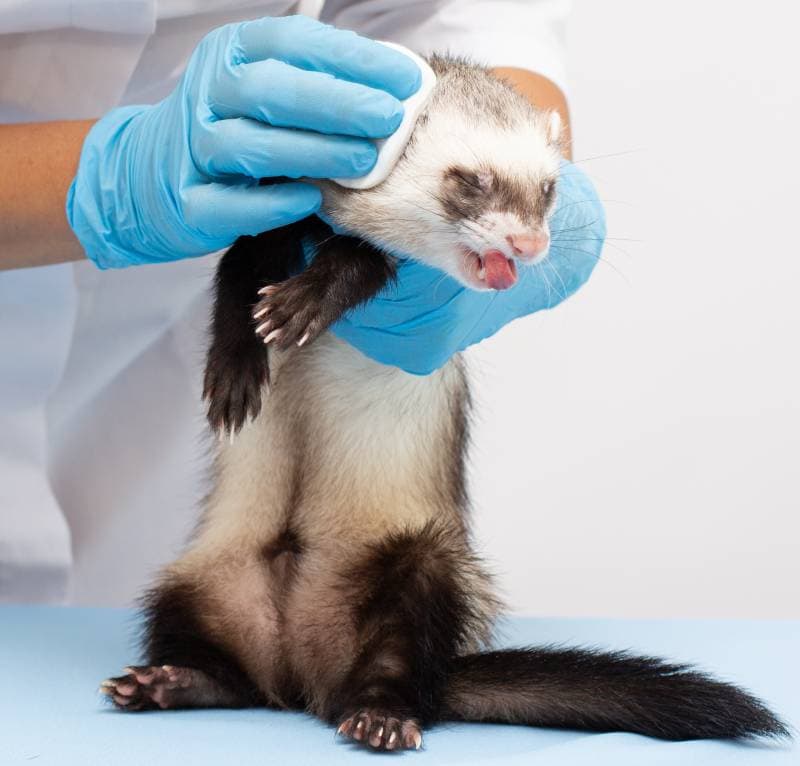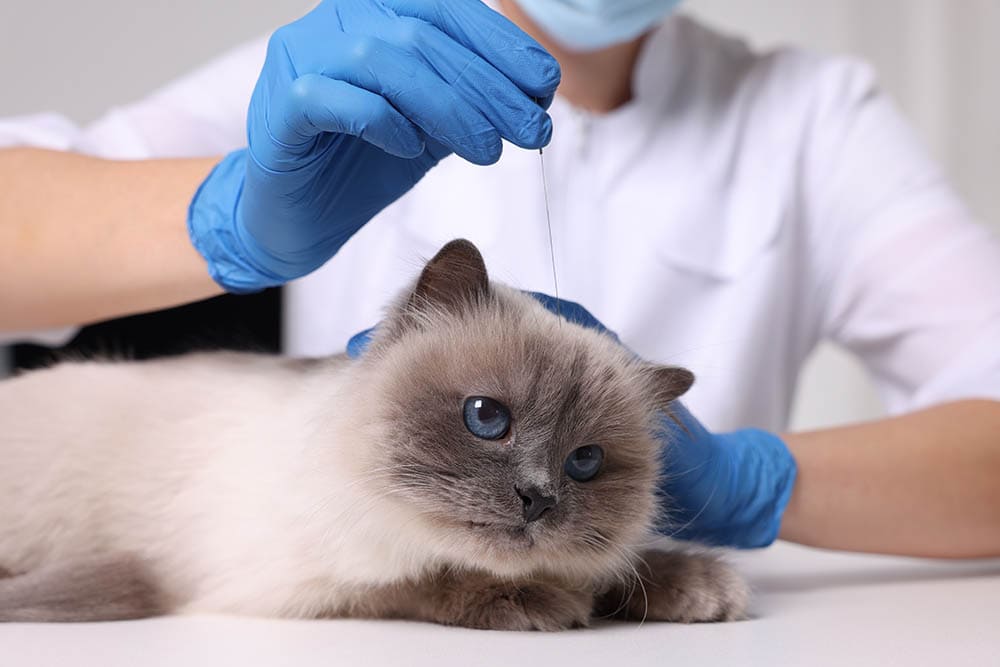Ear Mites in Ferrets: Our Vet Explains Signs, Causes, Care Tips & FAQ

Updated on

Your ferret is spending more time lately scratching at their ears than getting into mischief, so you decide to take them to the vet. You’ve noticed a lot of dark ear wax but thought it was normal, so when your vet takes a sample to analyze and proclaims that it is ear mites, you’re bewildered.
How do we treat these pesky critters, and do you have anything serious to worry about?
What Are Ear Mites?
Ear mites are tiny mites that belong to the species Otodectes cynotis. Sometimes, you can see them just by looking at your ferret’s ears, but you’ll typically need a microscope to detect them.
Ear mites can affect your ferret but also your dogs and cats, so you’ll need to treat everyone, especially if they spend a lot of time together snuggling. There’s no age range for getting ear mites: any age and sex can get these pesky parasites, mainly if they’re kept in an area with poor husbandry.
What Are the Signs of Ear Mites in Ferrets?
Ear mites usually cause a lot of itching. You might see your ferret digging at their ears constantly, but in the early stages, your ferret might not show any signs. If your ferret isn’t scratching at their ears, watch them to see if they’re shaking their head, another sign that their ears are bothering them.
When your ferret has an ear mite infection, your critter often has dark ear wax or cerumen. It is important to remember that some ear wax is perfectly normal, so don’t panic just because you see waxy debris in your ferret’s ears. While the wax is usually dark brown or black, it can have a reddish tint.
Because ear mites can be pruritic or cause itching, your ferret may have scratches around their face, especially around their ears. You might also see hair loss in these areas from constant scratching.

What Are the Causes of Ear Mites in Ferrets?
Ear mites are contagious, and that’s typically how your ferret gets them: from interacting closely with an animal with ear mites.
Ear mites tend to be more common in areas with larger ferret populations and where they are in close quarters, such as rescues and breeding facilities.
Diagnosing Ear Mites in Ferrets
When your veterinarian examines your ferret, they’ll usually check their ears. If you’ve noticed that your ferret has been scratching their ears lately, now is the time to tell an exotic vet.
While they might see mites crawling around in your ferret’s ears, it’s more likely that your vet will collect a swab sample to look for ear mites under the microscope. They’ll gently swipe out a sample from each ear using a cotton-tipped applicator. The chunkier, the better.
They will spread the sample of ear debris on a microscope slide in mineral oil and look for mites. Sometimes, you’ll find one floating in mineral oil and not moving. More commonly, you’ll see several crawling around on the slide. Talk about a creepy crawly!
How Do I Care for a Ferret With Ear Mites?
There aren’t any medications labeled for killing ear mites in ferrets, so veterinary professionals have to use medications off-label or in a manner different from what the label specifically outlines as treatment.
Don’t despair, though. Your veterinarian will be able to treat your ferret family member. The most common medications used to treat ear mites in ferrets are Revolution (selamectin) and ivermectin. Revolution is excellent because it’s also a flea and heartworm prevention product.
It may take multiple treatments to eradicate ear mites for your ferret. The topical medications don’t kill mite eggs, and they can take several weeks to hatch. According to PetMD, expect to treat your ferret every one to two weeks.
Make sure you only use what your veterinarian prescribes for your ferret because dosage amounts can vary based on your ferret’s size. These medications can cause serious potential side effects, including neurologic issues. When administering the medication, always follow your vet’s guidelines.
If your veterinarian tells you your ferret has ear mites, you’ll want to clean and change their bedding. Environmental control is essential to try and get rid of the infestation, help prevent reinfection, and minimize the chances of your other animals getting infected.
Ensure you talk to your veterinarian before using any products on or around your ferret. Certain chemicals, such as permethrin and organophosphate flea treatments, can be very toxic to your ferret.

Frequently Asked Questions
Can ear mites make ferrets sick?
Ear mites can make ferrets sick, in a sense. If your ferret has ear mites, these parasites can lead to secondary ear infections. In addition to ear mites and ear infections being itchy and uncomfortable, your ferret could develop an inner ear infection or even damage to their eardrum.
Inner ear damage can lead to health problems like dizziness or vertigo, commonly called vestibular syndrome. These issues can cause nausea and inappetence, so your ferret could lose weight. Over time, they’ll be at a higher risk for other infections.
Can humans get mites from ferrets?
You don’t have to worry about getting ear mites from your ferret friend. Your other pets might not be so lucky, as dogs, cats, and other ferrets can share ear mites back and forth. If you have other pets, you’ll want to make sure they get treated.
- Fleas
- Scabies mites (sarcoptic mange)
- Ringworm
- Campylobacter
- Salmonella
- Giardia
How do I clean my ferret’s ears?
Your veterinarian might recommend cleaning your ferret’s ears, even if they don’t have ear mites. You will need to be very careful when cleaning the ears. Cotton-tipped swabs like Q-tips are generally not recommended because you can push debris further into the ear and even perforate the eardrum.
Your best bet is to use a pet-safe ear cleaner. Your vet can recommend one for you to use, either prescribed by the veterinary hospital or available over the counter. Dampen a cotton ball with the cleaner to clean your ferret’s ears.

Conclusion
Ear mites are very itchy pests that are easily contagious between ferrets, dogs, and cats. You’ll want to work with your veterinarian to ensure your ferret gets treated with appropriate and safe medication.
Featured Image Credit: Irina Vasilevskaia, ShutterstockX













